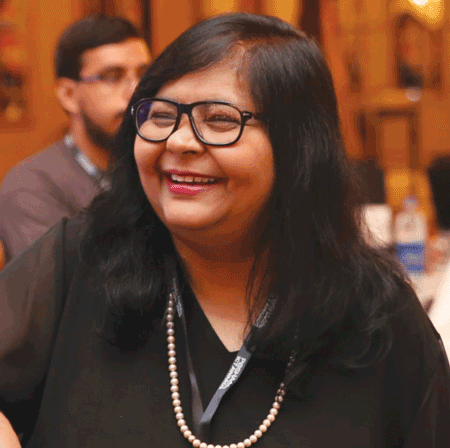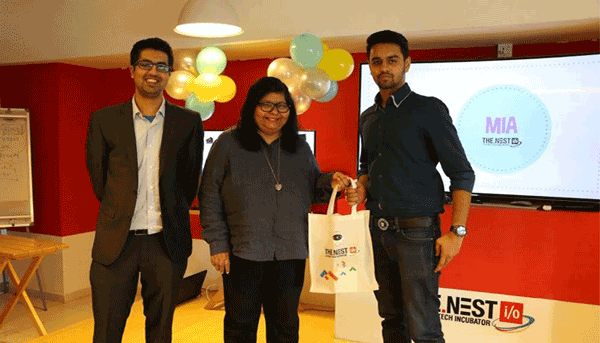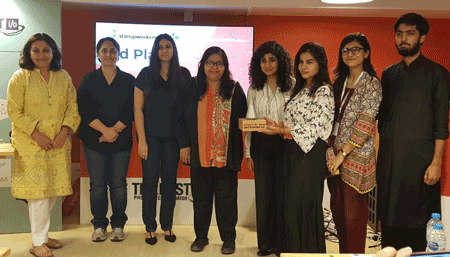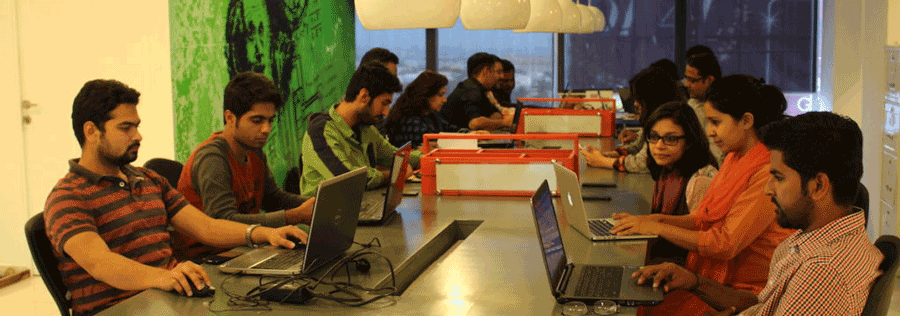Interview: Jehan Ara
By Zoha Liaquat | Interview | Published 6 years ago
How did the idea for The Nest I/O first come about?

– Jehan Ara, President, Pakistan Software Houses Association for IT and ITES, and founder of the Nest I/O
With 64 per cent of the total population of Pakistan below the age of 30, it is imperative to provide youth with quality education, gainful employment, and meaningful engagement that can harness their potential and help them compete on the global stage. We all know that it is highly unlikely that there will be enough jobs for these youngsters as they enter the job market. It is therefore essential that some of them pursue entrepreneurship and create opportunities for themselves and jobs for other young people.
Having said that, I have been a part of the Pakistan tech industry since the mid ’90s and some of us have seen the struggle that startups have to go through to validate their ideas, remain afloat and grow. My own startup journey also showed me that there was no real support system for startups in Pakistan.
That is why four-and-a half years ago we decided to set up The Nest I/O. Our mission has been clear from the beginning. To help support, empower, facilitate and connect the next generation of entrepreneurs – whatever it takes.
This has meant that in addition to incubating startup ideas, we have also worked on creating an eco-system that promotes innovation and entrepreneurship.
What does a regular day at work look like for you?
There is no such thing as a regular day for someone working in the startup eco-system. We may plan each day but what it ends up being can be very different.
I get to work in the morning between 8.30 and 9, Monday to Saturday, and don’t leave until at least 9 pm on most days. It doesn’t matter if I have just flown in from a business trip that very morning. A quick shower and change and I am at work. I get asked how I continue to keep this kind of schedule. My answer is always very simple – I love what I do, and that is what drives me.
My day usually starts before I get to The Nest I/O. I am an early riser so I check and respond to most emails before I get to work. That means once I am at work, I can focus on new strategies, brainstorming with the team and conversations with startup founders. There are regular events that take place at The Nest I/O, focused on design thinking, business modelling, marketing, creating networks, innovation and training workshops on different types of technologies. Because it is a startup space, it is full of energy at all times. There are people coming and going, who want to meet me and have a discourse. Some want to partner up on initiatives. Some want us to share our learnings and talk about impact. Most evenings I am in my own small but colourful office and numerous founders (current as well as alumni) walk in to discuss a problem, to ask for advice, to use me as a sounding board or just to have a conversation. Young people need someone who will listen to them without judging them – someone they feel they can trust and I feel privileged that, for the founders at The Nest, I am that person. Being a mentor or counsellor was not part of the initial plan but it has become the most important thing that I do on any day of the week.
 There are multiple events where I represent P@SHA and The Nest I/O on various panels that I am a part of, roundtables on various subjects where I am asked to give the perspective of the technology and startup sector.
There are multiple events where I represent P@SHA and The Nest I/O on various panels that I am a part of, roundtables on various subjects where I am asked to give the perspective of the technology and startup sector.
Almost every month I travel to some part of the world to talk about what is happening in the startup ecosystem and to showcase the dynamism that exists in the country.
Since the Nest I/O was built, the incubator ecosystem in Pakistan has come a long way. Did you ever imagine we would come this far when you first began working in tech?
Startups have been a part of our growth even before incubators and accelerators appeared on the scene – and even now there are many successful startups that have never been incubated anywhere. The likes of PakWheels, Bykea, Daraz, Zameen, just to name a few.
The technology scene has always excited me because most tech companies were started by individuals or groups of individuals who believed in themselves. This is still the case. Startup founders start with a dream and turn it into reality through passion, hard work, grit and a vision to create an impact.
Incubators have resulted in many more youngsters trying out ideas and turning them into ventures. It is still entrepreneurs with grit who are creating startups and growing them into successful companies. All that we are doing in the startup ecosystem is providing them with the support, connections and investment they need to accelerate the process.
I have always believed in the talent that exists in this country so I am not surprised at what has been achieved. I just feel that if more attention was paid to the challenges, this could have happened sooner. Even now, certain things need to change so that it becomes easier for entrepreneurs to embark on this journey and succeed.
When a startup idea is pitched to you, what factors are taken into consideration before deciding which ones make the cut?
When someone pitches an idea to us, the first thing we look at are the founders – their background, their passion, their commitment, how long they have known each other, what have they done together, have they gone past the idea stage and actually done some research, or experimentation on the idea?
A startup is all about the founders, and then about the product. Their first startup may or may not work but if it is a good team or even a single founder, he or she will learn from a failure and then move on to start another venture which could be very successful.
The next thing we look at is if they understand the domain they are planning to disrupt; if they have looked at the competitive landscape, if they know the basic challenges that they will face.
A very important element is that they must be coachable. They must be open to suggestions. The final decision on the direction their startup takes will be theirs but unless they are willing to look at the various options, listen to diverse points of view and learn from peers and mentors, things will be difficult for them.
The pitch needs to show if the idea is innovative, if there is a potential market for the product, do the founders have the capability and skill to deliver.
You have played a pivotal role in encouraging female entrepreneurs and tech-developers. Why has that been so important to you and how are women faring in tech as a whole?
 Women around the world are so smart and capable and able to do anything they set their minds to. The only problem is that they underestimate themselves and try and second-guess their own abilities. Sometimes it is their home environment or the faculty at universities or peers who convince them that there are certain things that women are good at, whereas there are other things that are beyond them. This is not true and I have made it my life’s mission to try and make young women explore their own talents and discover what it is that they want to do in life and then just march on and do it.
Women around the world are so smart and capable and able to do anything they set their minds to. The only problem is that they underestimate themselves and try and second-guess their own abilities. Sometimes it is their home environment or the faculty at universities or peers who convince them that there are certain things that women are good at, whereas there are other things that are beyond them. This is not true and I have made it my life’s mission to try and make young women explore their own talents and discover what it is that they want to do in life and then just march on and do it.
There are a lot of women who study Computer Science. They get top grades but not enough of them filter into the workforce and even those who do don’t appear to make it to Director or GM level. Very few start their own technology companies. This has always bothered me.
When we started The Nest I/O, we only had one woman founder in our first cohort. I went out and spoke about this at events, at universities and wherever I had the chance to express my views. What I found was that young women had never been told that starting a venture was an option that was open to them.
Slowly the numbers increased, and in our last cohort we had 50 per cent women founders. These women have all types of ventures – in education, healthcare, retail, travel, mental health, advocacy, content, social ventures, etc.
On the whole there are just over 20 per cent women who are part of the technology industry in Pakistan. These numbers need to grow. We have found that wherever women are given an opportunity, they have proven to be more productive, responsible, efficient, creative and have shown greater attention to detail. We need to increase the numbers and we need to provide more facilities and flexibility so that women can continue to work without neglecting their other responsibilities.
You’re now taking a step forward, working at the intersection of tech and social advocacy. When did you decide that this was something you wanted to use your platform for and why?
I have always considered technology to be an enabler and have, in the early days, used blog posts and YouTube to spread the word regarding policy interventions and possible repercussions. Very often people are unaware of what is happening until laws are enacted and then there is doom and gloom and agitation, but it is too late to do much at that stage.
As Facebook and Twitter became more pervasive and the number of users in Pakistan grew, I started using these platforms to have a discourse with younger people and for engagement with policy-makers and other stakeholders. These platforms, if used well, can be a great source for expressing your views and for consensus-building. I have found it very useful in my work, in community-building and in advocating for things I believe in. As long as the conversation is civil, there is no harm in engaging with people who have differing viewpoints. I have seen it work brilliantly.
IT is integrated into people’s everyday lives around the globe, but locally we are still skeptical of technology. The media, for instance, is so hung up on the idea of saving traditional mediums of disseminating information that we are falling behind on really exploring the – limitless – potential of tech. How do you think more industries can be encouraged to incorporate tech into their everyday workings?
It’s not a choice but a necessity to not only adopt technology but to totally transform digitally and to reimagine and restructure their businesses using technology. It’s already recognised as the only way to survive in the future and hence leading companies in every industry are trying to embrace “Digital transformation.” Companies like GE said in 2015 that we want to be the top 10 software companies in the world. Telecom companies like Telenor and Jazz refer to themselves as internet and digital companies, instead of telecom companies. Even in media/entertainment, with the rise of Spotify and Netflix and a decreasing interest in print, it is apparent that survival will only be through tech. So those who embrace it will be the winners. Others will go down in history as losing to this new wave.
What are some of the challenges faced by the IT industry and how has the government facilitated/not facilitated the growth of the IT sector in Pakistan?
The biggest challenge is the mindset of the bureaucracy and of decision-makers who are stuck in the industrial age and do not understand anything about IT. Hence the lens they use is that of the industrial sector. All the government policies and programmes are designed in a way that is counter-productive to the tech sector. In other forward-looking economies the approach towards innovation is, “Allow it to happen until we figure it out.” In Pakistan the approach is, “Stop it until we figure it out.”

So we put a stop to everything that we do not understand the potential for – we have stopped everything new and innovative from gaining root, be it Internet of Things (IoT), 3D printing, Drone technology, Driverless (mapping etc). All these technologies are being used elsewhere to improve productivity and processes – to try out new ways of doing things that will help the grow economy.
And look at us – on the one hand we talk about digitising Pakistan and on the other, we place a hefty tax on the import of mobile phones. I can understand placing such a tax on top-of-the line phones but not on all phones. We need to make sure that new and innovative technologies are available in Pakistan so that young people and companies can experiment, research and come up with solutions that work locally and internationally.
This message is being conveyed through the various taskforces to the government. Hopefully as they begin to understand, things will improve.
What kind of policies are required to create a more enabling environment for the growth of tech in Pakistan?
A total review of policies and government structure that deals with IT. IT is a cross-cutting function having major impact on all sectors like healthcare, defence, education, governance, banking, retail etc.
The IT Ministry needs to be cross-ministerial and the leadership has to come from the very top – i.e. the PM’s office. People with a background in technology and with proven experience need to be involved.
Policies need to be drafted in consultation with a multi-stakeholder group that includes business, technology and civil society along with government. Whether it is the import of technology, data protection and privacy policies, tax policies and human resource development, a broader and more in-depth look is necessary so that good intentions don’t backfire. Consistency of policies is also important. Off-the-hip comments like banning or restricting conversations on social media platforms only makes investors and tech companies nervous and stops growth from taking place. n
A journalism graduate, Zoha's core areas of interest include human and gender rights issues, alongside which she also writes about gender representation in the media and its impact on society.


